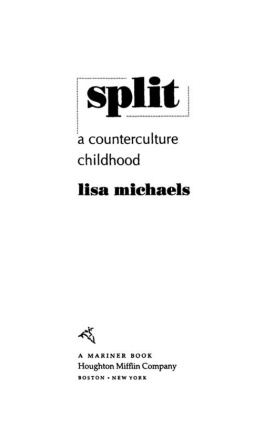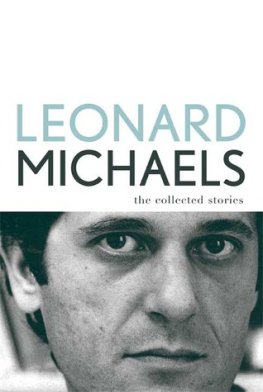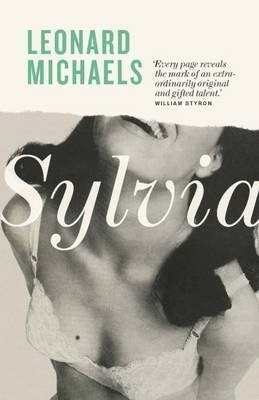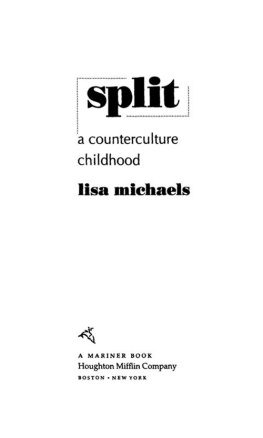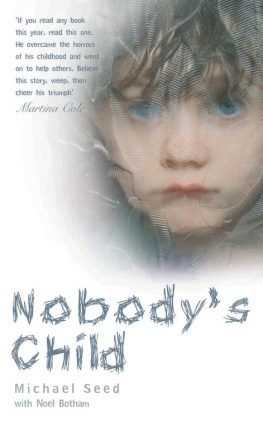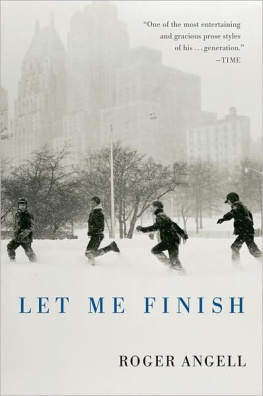First Mariner Books edition 1999
Copyright 1998 by Lisa Michaels
ALL RIGHTS RESERVED
For information about permission to reproduce
selections from this book, write to
Permissions, Houghton Mifflin Company,
215 Park Avenue South, New York,
New York 10003.
Library of Congress Cataloging-in-Publication Data
Michaels, Lisa.
Split: a counterculture childhood / Lisa Michaels
p. cm.
ISBN 0-395-83739-1
ISBN 0-395-95788-5 (pbk.)
1. Michaels, LisaChildhood and youth.
2. Authors, AmericanCaliforniaBiography.
3. HippiesCaliforniaBiography. 4. Subculture
CaliforniaHistory 20th century.
5. Communal livingCaliforniaHistory
20th century. 6. CaliforniaBiography. I. Title.
CT 275. M 51315 A 3 1998
979.4'05'092 [ B ] dc21 98-11867 CIP
Printed in the United States of America
Book design by Robert Overholtzer
QUM 10 9 8 7 6 5 4 3 2 1
The poem "The Burden of Protest" is reprinted
with permission from Life magazine.
Copyright Time Inc.
For my sisters and my brother
Acknowledgments
My thanks to Mauricio Schabes for his easy companionship, to Leslie Jonath and Bill Hayes, who took time away from their own writing to read drafts, and to Ann Lewis and Bernard Cooper for long-distance moral support. Dawn Seferian, Andrew Wylie, and, in particular, Sarah Chalfant had faith in this project from the beginning, for which I am amazed and grateful. Carl Walesa gave the manuscript a careful once-over. William Lung and Jin Auh helped with countless details. To Wendy Lesser I owe a debt that I can't repay. This book would not have been possible without her.
One
A FEW YEARS AGO, when I was visiting New York, my Grandma Leila (the archivist of the family) produced a pristine copy of Life magazine, dated November 21, 1969: the day I turned three. Johnny Cash is on the cover, playing acoustic guitar in front of the massive wheels of a freight train, steam gusting up around his waist. He has one pointy boot poised on the edge of a railroad tie, and a silver lam scarf glitters at his neck: "The Rough-Cut King of Country Music," the headline reads. Inside is an article on Jesse Jackson"black hope, white hope"and photographs of Dr. Elisabeth Kbler-Ross's first seminar on death and dying, in which a beautiful young woman talks about her leukemia while health care workers weep behind a two-way mirror. It is a sampling of the times, but that wasn't why my grandmother saved it for twenty-five years.
On the last page of the issue, under the heading "Parting Shots," is a picture of me just shy of three, carrying an unfurled Vietcong flag across a patch of trampled grass. At the top of the frame, the flag bisects the body of a man, leaving a diagonal of rumpled coat, one arm stuffed into a pocket. Long, bottle-nosed cars are parked on the street behind him, bleached white by the glare. What looks to be cold autumnal light shines through the flagtwo silky panels with a star in the centerand lifts a white corona around the edges of my head. I look highly serious, hunched over to counter the weight of the long pole, wearing a short dress and little brown work boots: a pintsize protester, trudging along, head down, my chin slung forward in concentration.
The editors at Life wrote a poem to go with the picture, which they called "The Burden of Protest":
Is toting a Vietcong flag
In a war demonstration the bag
Of a child or a parent?
We'd say someone's errant
This kid should be off playing tag.
It's a smarmy piece of copynever a good idea to take the moral high ground in a limerick. Notably, the poem took a potshot at my mother, who to the editor's mind was conspicuously absent, having loaded me up with my ideological burden and disappeared.
But my mother says she was there that day, and the picture lied: I had picked up the flag on my own. She can almost recite the doggerel from memory. "That poem was a criticism of my parenting," she said once with a laugh. "Some mothers worried about stuff going on at those rallies, but me, a nice girl from the suburbs, I was a trusting soul. I came to pick you up from your dad and there you were dancing around with that flag. Your dressyou can't see this from the picture because it's black-and-whitewas red velvet, a real thick velvet, and some part of the flag was red and you looked gorgeous. They found one shot where you seem burdened, but really you were having a blast. And the photographer knew it."
The first time I saw this picture was in my father's house. I must have been eight or so. He had trimmed away the offending poem, framed the photo in mat board, and typed his own caption. I can't reconstruct his text entire, because the picture was lost in some move, but his final line sticks in my head: "Could it be that at three you caught the spirit of the worldwide movement for socialism, and shouted, 'Hey, everybody, wait for me!'"
Clearly, he had caught the spirit. I imagine that at three I measured the world on more intimate terms: my father was the sun; my mother was the moon. Years later when I looked at my father's handiwork, hung in the living room, the site of many a strategy meeting and leaflet-folding session, I felt a mixture of pride and pique. I was the treasured one, matted and reframed. But his gaze fell on me at an odd angle. That caption says much about what my father wanted me to be: a comrade, a willing enthusiast for the work to be done.
But caption or no caption, looking at that picture now takes my breath away. November 21, 1969. Two months earlier, my father carried that same flag into the Harvard Center for International Affairsan organization that did counterinsurgency research for the governmentand along with twenty of his fellow Weathermen ran through the building, dumping over filing cabinets, breaking windows, and tearing out phones. In the tumult, blows were exchanged between protesters and staff. Two months after the picture was snapped my father would be in prison. When I swung that flag across Boston Common, it was a swath of fabric to me, nothing more. I waved it over the sunlit grass in a calm between emergencies, one sock up, one down, oblivious to what was to come.
I told my mother the story of my father's caption, nearly thirty years after their divorce, and she laughed with a rueful note of recognition. Still, I was surprised that she didn't leap at the chance to peg him. Instead, her laughter wound down to a sigh: "Well, I suppose my reading is just as suspect. So Pollyan-naish: the sun was shining; you were the perfect child." And it's true, out of the tangle of the past my mother preserves mostly primary colors, the quality of the light, my power and exuberance. Even though she knew that in those months my father was anxiously preparing for his trial, that she was planning to pack up and head for Mexico, that our lives were about to fly apart.
My parents met at Cornell in 1962, on a grassy slope overlooking Lake Cayuga. My father, a junior, was a fitful student; my mother was a freshman, thrilled to be taking up the scholar's life. When I asked her what she thought of him that first day, she squinted off into the distance, choosing each word carefully"lean, intense and witty, sparkly-eyed, charming." She wore her hair shoulder length, bobbed up like a Ronette, her eyes rimmed with black liner. And the clothes? "I think we wore skirts, for crying out loud. Short skirtsabove our knees." I wanted to see how they looked, what they wore, but my mother would rather describe the surroundings: the big drop down from Cornell to the lake, a narrow band of silver visible through the trees, the magnolia in the library courtyard that scented the air at that time of year.
My father invited her to see a musical at the playhouse. It was The Fantasticks,
Next page
